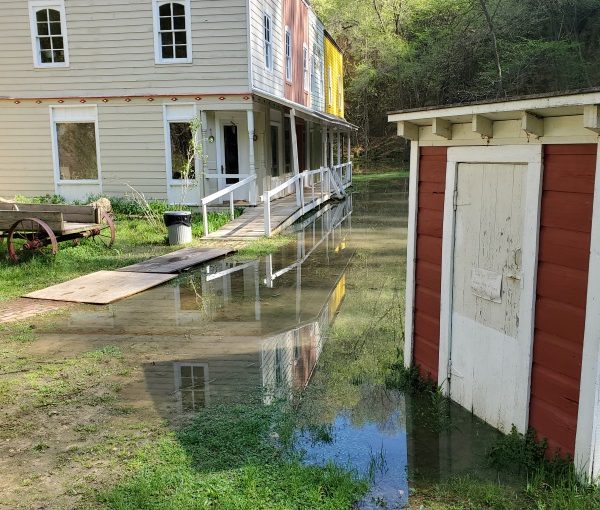Heritage Canyon historical interpreters, who came to prepare 11 buildings prior to Dutch Days in Fulton, IL, were delighted to find dry ground on Wednesday, May 1, and Thursday, May 2, 2019. Previous rains had been persistent, falling on saturated ground. However, when they arrived early on Opening Day, Friday, May 3, water had seeped out of the ground overnight.
It gathered into a large pond beside the gazebo, yet safely away from the nearby Church. Shallower water pooled around buildings in the lower level of the canyon.

Seepage had nowhere to go and remained through Saturday, day two. Brick sidewalks and two, wood planks to the General Store allowed dry passage for visitors, during an otherwise pleasant, spring day. The Iron Works was reached by brick pavers just beyond the water’s edge.

Glassy water puddling in front of the School House mimicked a beginning rice paddy. It made for another perfect mirror image.

Before the canyon opened Rev. Danny Lybarger of Abingdon, IL, foraged through the apple orchard. He found examples of two common, low-growing weeds: plantain and violet. Their leaves, he noted, when brewed together as a tea, have medicinal properties to ease sinus drainage. Atop the hill near the Town Hall, he played a wooden flute, shared Native American history, and told stories during Dutch Days.

The 1860’s House was a cozy place for Randall Wolf to await visitors. This building and its separate Summer Kitchen are the only authentic structures in the Canyon. The buildings were removed board-by-board from the Don Temple farm in the Garden Plain, IL, area. Upstairs is a sleeping loft, but visitors do not ascend the steps. Beneath the floor is a recessed space dug into the ground. It is used by Early American Crafters to keep items cool, following the example of early homesteaders.

Davenport, IA, wood carver John Stoltz applied his skills inside the Iron Works, during his first participation at Dutch Days. The bottle and goblets are not his creation; they were turned on a lathe. He displayed various spoons, scoops, and spreaders; picks; a whistle; two Christmas ornaments; walking sticks and canes. He uses numerous types of wood. Stoltz carves horn, antlers, and bone, too.


Kevin Gravert, 9, son of Marc and Catherine, of Fulton, has been a reenactor with the Early American Crafters since he was born.

